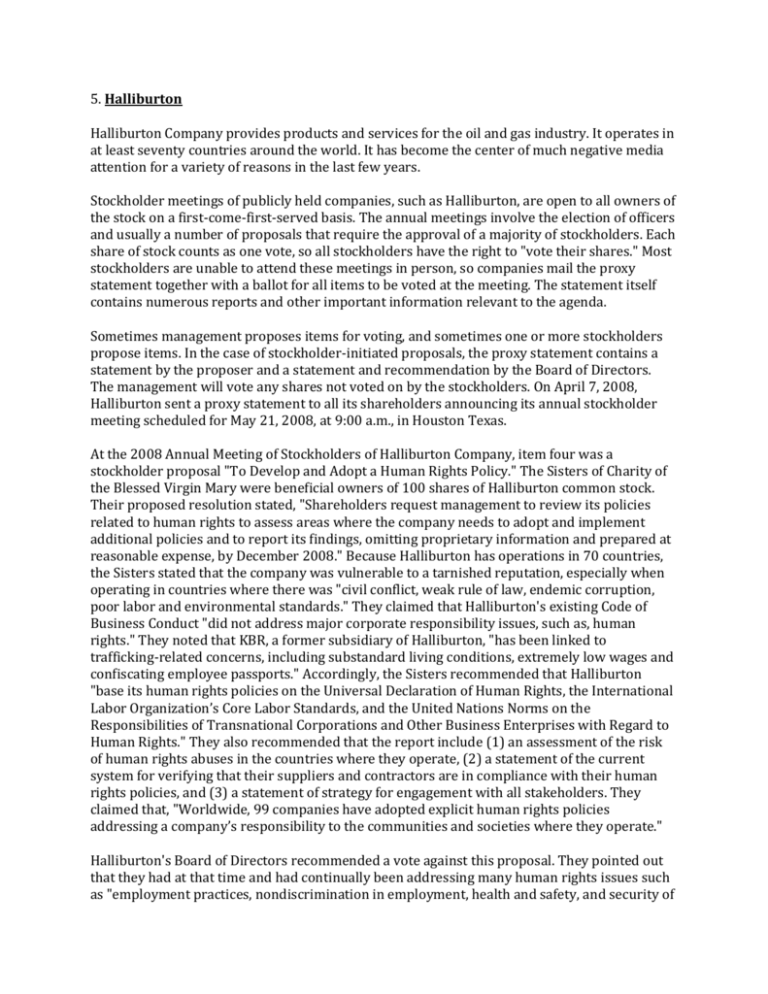5. Halliburton Halliburton Company provides products and services
advertisement

5. Halliburton Halliburton Company provides products and services for the oil and gas industry. It operates in at least seventy countries around the world. It has become the center of much negative media attention for a variety of reasons in the last few years. Stockholder meetings of publicly held companies, such as Halliburton, are open to all owners of the stock on a first-come-first-served basis. The annual meetings involve the election of officers and usually a number of proposals that require the approval of a majority of stockholders. Each share of stock counts as one vote, so all stockholders have the right to "vote their shares." Most stockholders are unable to attend these meetings in person, so companies mail the proxy statement together with a ballot for all items to be voted at the meeting. The statement itself contains numerous reports and other important information relevant to the agenda. Sometimes management proposes items for voting, and sometimes one or more stockholders propose items. In the case of stockholder-initiated proposals, the proxy statement contains a statement by the proposer and a statement and recommendation by the Board of Directors. The management will vote any shares not voted on by the stockholders. On April 7, 2008, Halliburton sent a proxy statement to all its shareholders announcing its annual stockholder meeting scheduled for May 21, 2008, at 9:00 a.m., in Houston Texas. At the 2008 Annual Meeting of Stockholders of Halliburton Company, item four was a stockholder proposal "To Develop and Adopt a Human Rights Policy." The Sisters of Charity of the Blessed Virgin Mary were beneficial owners of 100 shares of Halliburton common stock. Their proposed resolution stated, "Shareholders request management to review its policies related to human rights to assess areas where the company needs to adopt and implement additional policies and to report its findings, omitting proprietary information and prepared at reasonable expense, by December 2008." Because Halliburton has operations in 70 countries, the Sisters stated that the company was vulnerable to a tarnished reputation, especially when operating in countries where there was "civil conflict, weak rule of law, endemic corruption, poor labor and environmental standards." They claimed that Halliburton's existing Code of Business Conduct "did not address major corporate responsibility issues, such as, human rights." They noted that KBR, a former subsidiary of Halliburton, "has been linked to trafficking-related concerns, including substandard living conditions, extremely low wages and confiscating employee passports." Accordingly, the Sisters recommended that Halliburton "base its human rights policies on the Universal Declaration of Human Rights, the International Labor Organization’s Core Labor Standards, and the United Nations Norms on the Responsibilities of Transnational Corporations and Other Business Enterprises with Regard to Human Rights." They also recommended that the report include (1) an assessment of the risk of human rights abuses in the countries where they operate, (2) a statement of the current system for verifying that their suppliers and contractors are in compliance with their human rights policies, and (3) a statement of strategy for engagement with all stakeholders. They claimed that, "Worldwide, 99 companies have adopted explicit human rights policies addressing a company’s responsibility to the communities and societies where they operate." Halliburton's Board of Directors recommended a vote against this proposal. They pointed out that they had at that time and had continually been addressing many human rights issues such as "employment practices, nondiscrimination in employment, health and safety, and security of employees and company facilities." They pointed to Halliburton's existing Code of Business Conduct and to its employee policies and guidelines, saying these documents "substantially incorporate laws and ethical principles including those pertaining to freedom of association, non-discrimination, privacy, collective bargaining, immigration and wages and hours. In some instances, our policies provide protections beyond what is required by law." The Board's comments about the proposal included a list of policies that covered many issues such as equal employment; internal accounting controls; antitrust and competition; harassment; health, safety, and the environment; and sensitive transactions. In partial elaboration of this last policy, they said, "Our employees are strictly prohibited from paying any bribe, kickback or other similar unlawful payment to, or otherwise entering into a sensitive transaction with, any public official, political party or official, candidate for public office or other individual, in any country, to secure any contract, concession or other favorable treatment." In addition to these policies, they pointed to a corporate policy (3-1573), on Minimum Employment Age Requirement, which, they said, "Establishes that we will not employ anyone, in any capacity, who is under the age of 18 years, except where this minimum employment age requirement is superseded by local law. Where local law supersedes our policy, we will not assign employees under the age of 18 to dangerous or hazardous occupations." The Board of Directors felt that, given these existing policies, no explicit policy on human rights was necessary. At the May 21 meeting, the stockholders voted against all stockholder-initiated proposals, including that of the Sisters of Charity of the Blessed Virgin Mary.






